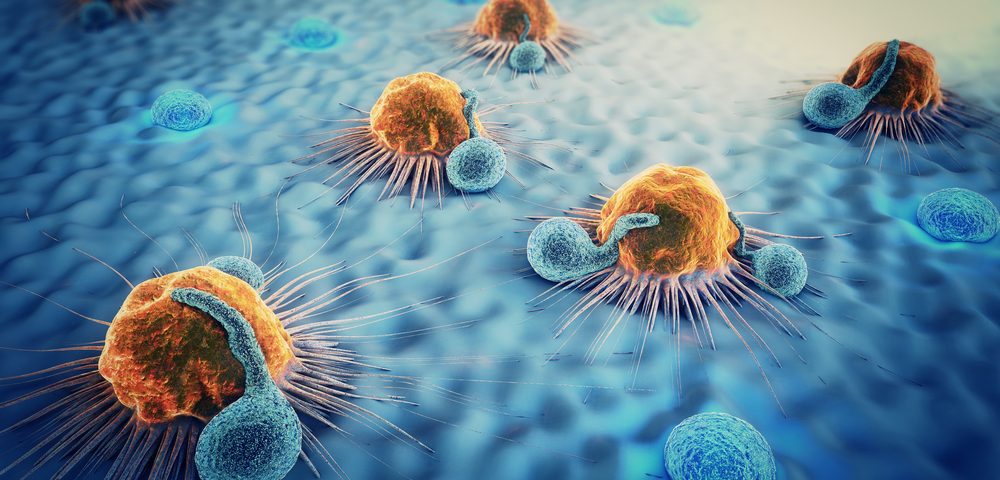Targeting a specific cellular pathway may improve the effectiveness of radiotherapy given to cancer patients by activating the immune system, according to a study in mice.
The research, “Non-canonical NF-κB Antagonizes STING Sensor-Mediated DNA Sensing in Radiotherapy,” appeared in the journal Immunity.
Work over the last decade has shown that interaction between the body’s immune system and radiotherapy is as important as radiation itself for the treatment’s efficacy. Radiation-induced cellular destruction attracts immune cells known as dendritic cells, which are required to activate T-cells — another type of immune cell – that ultimately dismantle cancer cell fragments.
Researchers, led by The University of Chicago’s Ralph Weichselbaum and University of Texas Southwestern Medical Center’s Yang Xin Fu, studied how two versions of the nuclear factor-κB (NF-κB) signaling pathway — a family of gene expression regulators — respond to radiation therapy in opposing ways. These two pathways use different NF-kB proteins that produce distinct cellular effects.
NF-κB1 is thought to be a major regulator of the immune system’s B-cells. This canonical pathway — and the less known “non-canonical” pathway — have become a major focus in different research areas, including inflammation, immunity and cancer.
The team’s prior studies had shown that the canonical NF-kB pathway plays a role in anti-tumor immunity by regulating the production of molecules called type I interferons (IFNs). These molecules boost dendritic cell function. However, radiation-induced IFN production can lead to immune suppression by recruiting a specific type of immune cell, called monocytic myeloid-derived suppressor cells, to the tumor site.
These researchers, working in mice, now found that disrupting the canonical NF-kB pathway — a popular strategy in drug discovery — actually makes radiotherapy less effective. It inhibits rather than enhances the immune system.
“Inhibiting what is known as the canonical NF-κB family has been shown to increase cancer cell killing in tissue culture and has become an area of investigation to improve cancer radiotherapy,” Weichselbaum said in a press release. However, “earlier results from these studies failed to improve the response to radiotherapy in animals or humans.”
They found that interfering with the non-canonical NF-kB pathway had the opposite effect. Tumor cells subjected to radiotherapy activated this non-canonical route in dendritic cells, boosting overall anti-cancer immune response through type I IFN. Importantly, inhibiting this non-canonical signaling enhanced radiation ability to kill tumor cells.
“These findings provide a fresh direction for developing therapeutic strategies targeting NF-kB pathways,” the researchers wrote. “By blocking that alternative pathway, rather than the pathway everyone’s been focusing on, we think we can get better radio-sensitizing agents, and better results,” Fu said.
Weichselbaum considers the interaction between radiation and the immune system counterintuitive. “The notion that radiation supplements the immune system is still somewhat controversial,” he said.
Results also showed that a pathway involving a protein called STING — known for recognizing viral and bacterial DNA — was activated by DNA released by irradiated tumor cells, a finding the investigators considered surprising.
“We have learned that radiation therapy does depend on DNA damage and repair,” Fu said. The immune system responds to damaged DNA “as if it were a viral infection,” boosting an anti-cancer response. “We think this could lead to a whole new therapeutic strategy. Our mice are often cured,” he added.
While cautioning that the work is still preliminary, Weichselbaum said the team is trying to translate the results to patients. He added that the approach “works even better when we add checkpoint inhibitors,” medications designed to block cancer cells’ strategies to evade immune attack. “This could become a novel combination approach to improving cancer treatment.”


